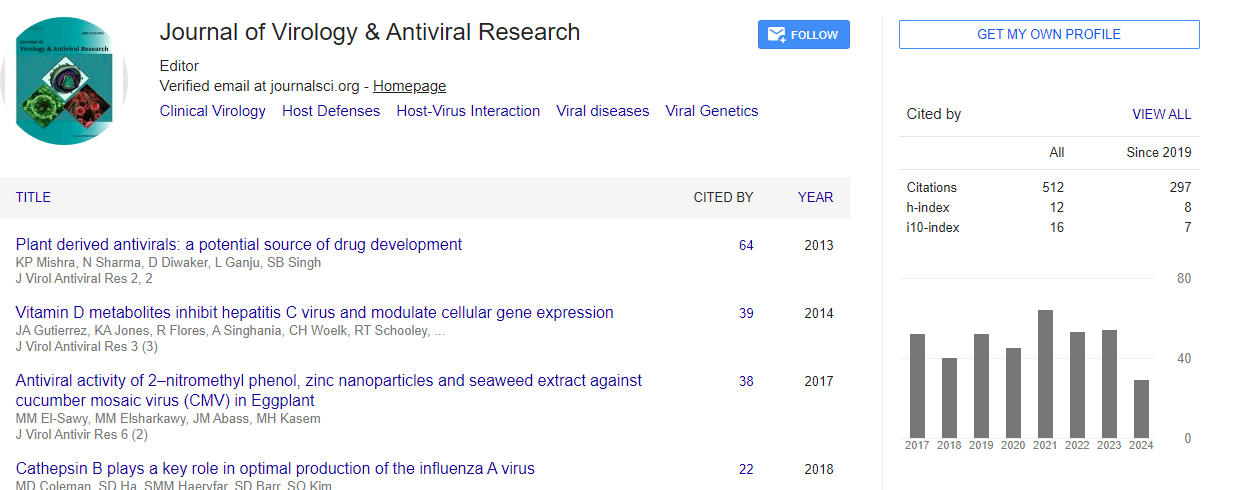Perspective, J Virol Antivir Vol: 12 Issue: 2
Exploring the Complex Nexus: HIV and the Central Nervous System
Lacy Schaeffer*
1Department of Hematology, Loma Linda University, California, USA
*Corresponding Author: Lacy Schaeffer,
Department of Hematology, Loma Linda
University, California, USA
E-mail: schaeffer68@llu.edu
Received date: 22 May, 2023, Manuscript No. JVA-23-107835;
Editor assigned date: 31 May, 2023, PreQC No. JVA-23-107835 (PQ);
Reviewed date: 15 June, 2023, QC No. JVA-23-107835;
Revised date: 22 June, 2023, Manuscript No. JVA-23-107835 (R);
Published date: 29 June, 2023, DOI: 10.4172/2324-8955.1000675
Citation: Schaeffer L (2023) Exploring the Complex Nexus: HIV and the Central Nervous System. J Virol Antivir Res 12:1.
Abstract
Description
Human Immunodeficiency Virus (HIV) remains a formidable global health challenge, affecting millions worldwide. While significant progress has been made in managing HIV through Antiretroviral Therapy (ART), the virus continues to impact multiple organ systems, including the Central Nervous System (CNS). HIV-associated neurological complications have emerged as critical concerns, posing unique challenges to patients and clinicians. In this perspective article, we delve into the intricate relationship between HIV and the CNS, exploring the neurological implications of HIV infection and the ongoing research efforts to address these complexities. By understanding the interplay between HIV and the CNS, we aim to shed light on potential therapeutic strategies and improve patient outcomes.
The intersection of HIV and the central nervous system
HIV is a lentivirus that primarily targets CD4+ T cells, impairing the immune system and leading to Acquired Immunodeficiency Syndrome (AIDS). While antiretroviral therapy has dramatically increased the life expectancy and quality of life for HIV-infected individuals, the virus's ability to enter the CNS has significant consequences. Upon HIV entry into the CNS, infected immune cells and the virus itself can cross the blood-brain barrier, leading to persistent viral replication within the brain.
This viral invasion triggers a cascade of inflammatory responses and immune activation, causing neurological damage and leading to a spectrum of HIV-Associated Neurocognitive Disorders (HAND). HAND encompasses a range of cognitive, motor, and behavioral impairments, ranging from Mild Cognitive Impairment (MCI) to more severe forms of HIV-Associated Dementia (HAD). These neurological complications can significantly impact patients' daily functioning, affecting their independence and quality of life. Moreover, the emergence of long-term ART has revealed the persistence of low-level viral replication in the CNS, further complicating the management of HIV-associated neurologic complications.
Understanding HIV-related neurological implications
HIV-associated neurological complications arise from a complex interplay of viral and host factors within the CNS. Viral replication within the CNS t riggers an inflammatory response, leading to the release of pro-inflammatory cytokines, chemokines, and neurotoxic substances. This neuroinflammation contributes to neuronal injury and synaptic dysfunction, leading to cognitive deficits. HIV encodes several neurotoxic proteins, such as Tat and gp120, which contribute to neuronal damage and dysfunction. These proteins can directly interact with neurons, leading to oxidative stress and apoptosis. Microglia, the resident immune cells of the CNS, become activated in response to viral invasion. While this immune activation aims to clear infected cells, prolonged activation can lead to neurotoxicity and synaptic dysfunction. Systemic inflammation resulting from chronic HIV infection can also impact the CNS indirectly, further exacerbating neurological complications.
Challenges in diagnosing and managing HIV-associated neurological complications
HIV-associated neurocognitive disorders encompass a continuum of cognitive impairment, ranging from Asymptomatic Neurocognitive Impairment (ANI) to Mild Neurocognitive Disorder (MND) and HIVAssociated Dementia (HAD).
ANI (Asymptomatic Neurocognitive Impairment) refers to mild cognitive deficits that do not significantly impact daily functioning. However, patients with ANI may still experience subtle cognitive changes that warrant monitoring and early intervention.
MND (Mild Neurocognitive Disorder) is characterized by mild cognitive impairment that affects daily functioning to some extent. These cognitive deficits may manifest as difficulties in concentration, memory, and executive functions.
HAD (HIV-Associated Dementia) represents the most severe form of HIV-related neurocognitive impairment. Patients with HAD experience significant cognitive deficits that interfere with daily activities, leading to impaired independence and reduced quality of life.
Examples of broad-spectrum antiviral candidates
Diagnosing HIV-associated neurological complications presents significant challenges due to the heterogeneity of clinical presentations and the lack of specific biomarkers for these conditions. Neuropsychological testing and clinical assessment play crucial roles in detecting cognitive impairment, but these methods may not capture early or subtle changes. Additionally, the co-occurrence of other neurologic conditions and comorbidities in HIV-infected individuals further complicates diagnosis and management. It is essential to differentiate between HIV-associated neurocognitive disorders and other neurodegenerative diseases, such as Alzheimer's disease or cerebrovascular disease, to tailor appropriate treatments. The management of HIV-associated neurological complications requires a comprehensive approach, integrating ART, anti-inflammatory therapies, and neuroprotective interventions. However, the efficacy of specific treatments for HAND remains limited, underscoring the need for targeted therapies.
Advances in research and future perspectives
The study of HIV and the CNS continues to evolve, with ongoing research efforts focusing on understanding the underlying mechanisms of neurotoxicity, developing novel therapeutic strategies, and improving patient outcomes.
Combination therapies: Combining ART with adjunctive therapies, such as anti-inflammatory agents or neuroprotective drugs, is a promising approach to target multiple pathways involved in neurotoxicity. Studies investigating the potential of anti-inflammatory agents, antioxidants, and neurotrophic factors are underway to attenuate neuroinflammation and promote neuronal repair.
Targeted drug delivery: Developing methods for targeted drug delivery to the CNS could enhance the efficacy of neuroprotective therapies. Nanotechnology-based drug delivery systems and bloodbrain barrier penetration strategies hold promise in optimizing drug distribution to affected brain regions.
Neuroimaging and biomarkers: Neuroimaging techniques, such as Magnetic Resonance Imaging (MRI) and Positron Emission Tomography (PET), offer valuable insights into structural and functional changes in the brain associated with HIV-related neurotoxicity. Identifying reliable biomarkers, such as Cerebrospinal Fluid (CSF) markers, may aid in early diagnosis and monitoring of neurological complications.
Neuroprotective vaccines: Researchers are exploring the potential of therapeutic vaccines designed to stimulate the immune system to target viral reservoirs in the CNS. These neuroprotective vaccines aim to reduce viral burden within the brain, potentially delaying or preventing the onset of HIV-associated neurocognitive disorders.
Conclusion
The complex relationship between HIV and the CNS underscores the importance of understanding the neurological implications of HIV infection. HIV-associated neurocognitive disorders present a significant challenge, affecting patients' cognitive and functional abilities. Ongoing research efforts in elucidating the mechanisms of HIV-related neurotoxicity and developing targeted therapies offer hope for improved patient outcomes. The integration of multidisciplinary research, from virology and immunology to neurology and drug delivery, will pave the way towards comprehensive management strategies for HIV-infected individuals, optimizing their cognitive health and enhancing their quality of life.
 Spanish
Spanish  Chinese
Chinese  Russian
Russian  German
German  French
French  Japanese
Japanese  Portuguese
Portuguese  Hindi
Hindi 

